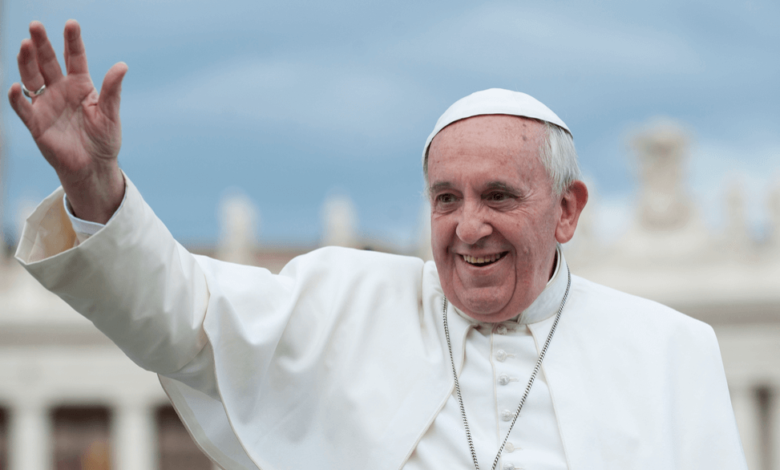Pope Francis Net Worth: The Leader of the Catholic Church’s Finances

Pope Francis, as the spiritual leader of over a billion Catholics worldwide, presents a unique case when examining his personal finances in relation to the Vatican’s considerable wealth. With a reported net worth of approximately $10,000, his financial choices starkly contrast with the opulence often associated with such a high office. This disparity raises important questions about the role of financial transparency and responsible stewardship within the Church. What implications might his approach have for the future of Church finances and its broader mission?
Overview of Pope Francis’s Life
Pope Francis, born Jorge Mario Bergoglio in Buenos Aires, Argentina, on December 17, 1936, is the first Jesuit pope and the first from the Americas, reflecting a significant shift in the global leadership of the Catholic Church.
His upbringing in a modest family and the Jesuit influence on his education instilled values of humility, service, and social justice, shaping his papacy profoundly.
See also: Cassandra Peterson Net Worth: Elvira’s Financial Success
Understanding the Vatican’s Wealth
The Vatican’s wealth, derived from various sources including donations, investments, and real estate holdings, plays a crucial role in its global operations and philanthropic initiatives.
Vatican assets encompass a diverse portfolio, reflecting strategic Church investments aimed at sustaining its mission.
This financial foundation enables the Vatican to engage in charitable work, maintain historic sites, and support communities worldwide, affirming its enduring influence.
Pope Francis’s Personal Assets
Personal assets of Pope Francis are modest compared to the vast wealth of the Vatican, reflecting his commitment to a life of humility and service. His personal investments are limited, and asset management is approached with simplicity, prioritizing charitable endeavors over personal gain.
| Asset Type | Estimated Value | Purpose |
|---|---|---|
| Personal Savings | $10,000 | Emergency Fund |
| Investments | $5,000 | Charitable Contributions |
| Real Estate | $0 | N/A |
| Vehicles | $15,000 | Transportation |
| Art Collection | $1,000 | Personal Enjoyment |
The Pope’s Lifestyle Choices
Pope Francis is known for his commitment to modest living standards, which reflects his emphasis on humility and simplicity.
His lifestyle choices prioritize charitable contributions, demonstrating a focus on aiding those in need rather than personal accumulation of wealth.
Additionally, his personal spending habits align with these values, further illustrating his dedication to a life of service and responsibility.
Modest Living Standards
Modest living standards characterize the lifestyle choices of the current pontiff, reflecting a commitment to simplicity and humility in accordance with his values. His humble origins and simple habits manifest in daily routines that prioritize service over luxury, further emphasizing his dedication to the teachings of Christ.
| Aspect | Description | Impact |
|---|---|---|
| Housing | Simple Vatican residence | Accessibility to all |
| Meals | Basic, communal dining | Promotes equality |
| Attire | Unadorned vestments | Symbol of humility |
| Transportation | Public transport | Reduces environmental impact |
| Engagement | Frequent public appearances | Strengthens community ties |
Charitable Contributions Focus
A commitment to charitable contributions underscores the pontiff’s lifestyle choices, reflecting a profound dedication to alleviating poverty and promoting social justice.
Pope Francis emphasizes charity outreach initiatives, aiming to maximize donation impact on vulnerable communities.
His advocacy for equitable resource distribution not only enhances the Catholic Church’s charitable identity but also inspires followers to engage in acts of kindness and support global humanitarian efforts.
Personal Spending Habits
Personal spending habits of the pontiff reflect a lifestyle characterized by simplicity and frugality, aligning with his commitment to the values of humility and service.
Pope Francis emphasizes personal budgeting and prioritizes financial allocations that support the marginalized and the Church’s mission.
His choices exemplify a deliberate focus on essential needs, reinforcing a model of stewardship that resonates with his spiritual and ethical commitments.
Financial Transparency in the Vatican
Financial transparency within the Vatican has become a focal point of scrutiny and reform in recent years.
Efforts to enhance transparency in Vatican financial practices are increasingly important in fostering trust among the global Catholic community and beyond.
This discussion will explore the specific initiatives implemented to address these concerns and their implications for the Vatican’s financial oversight.
Vatican Financial Practices
Vatican financial practices have increasingly come under scrutiny as the Holy See seeks to enhance transparency and accountability in its fiscal operations.
Key aspects of this evolution include:
- Improved Vatican budgeting processes
- Strengthened financial accountability measures
- Increased external audits and evaluations
These initiatives aim to foster public trust and ensure that the Church’s resources are managed responsibly and ethically.
Transparency Initiatives Implemented
In response to growing demands for accountability, the Vatican has implemented a series of transparency initiatives aimed at enhancing the oversight and management of its financial resources.
These measures focus on financial accountability and budget transparency, fostering a culture of openness.
Charitable Contributions and Initiatives
Pope Francis has consistently prioritized charitable contributions and initiatives, reflecting his commitment to social justice and the alleviation of global poverty. His approach includes:
- Innovative charity programs targeting vulnerable populations
- Collaborative fundraising strategies engaging global communities
- Promoting awareness of social issues through church outreach
These efforts not only enhance the Catholic Church’s mission but also empower individuals to participate in acts of compassion and solidarity.
The Role of Donations
Donations play a crucial role in sustaining the various charitable initiatives championed by Pope Francis, enabling the Catholic Church to address pressing social issues and support marginalized communities worldwide.
The donation impact is significant, as these contributions directly fund outreach programs and social justice efforts.
Innovative fundraising strategies are employed to maximize engagement and support, fostering a deeper connection between donors and the Church’s mission.
The Future of Church Finances
The future of church finances will likely be shaped by evolving economic conditions, increasing transparency demands, and the need for sustainable funding models that align with the Catholic Church’s mission and outreach efforts.
Key considerations will include:
- Diversifying income sources to ensure stability
- Engaging younger generations for future donations
- Enhancing accountability to foster trust and commitment
These factors will influence the Church’s financial sustainability.
Conclusion
Pope Francis exemplifies a stark contrast between personal modesty and the vast wealth of the Vatican.
While the institution holds immense financial resources, the Pope’s personal net worth remains a mere $10,000, highlighting a commitment to humility and service.
This juxtaposition underscores a broader narrative of financial transparency and social responsibility within the Church.
As the leader of a global faith, prioritizing charitable initiatives over personal gain reinforces the mission of fostering trust and community support in an increasingly complex world.




